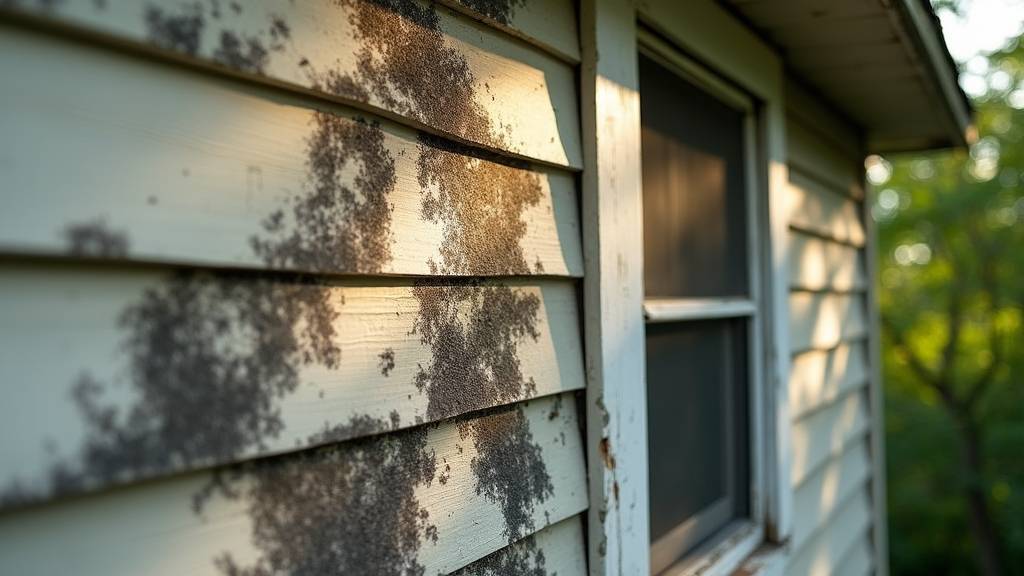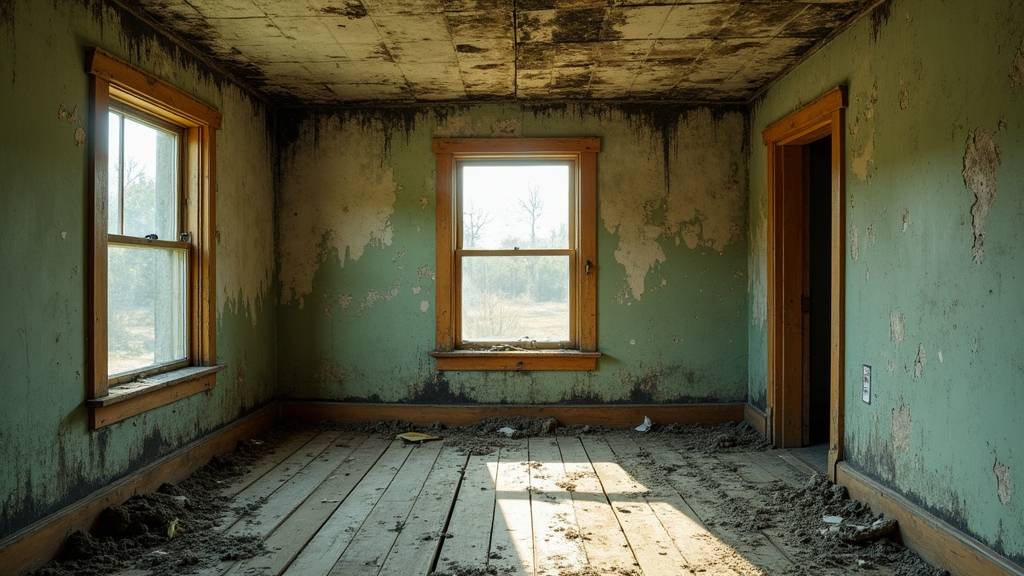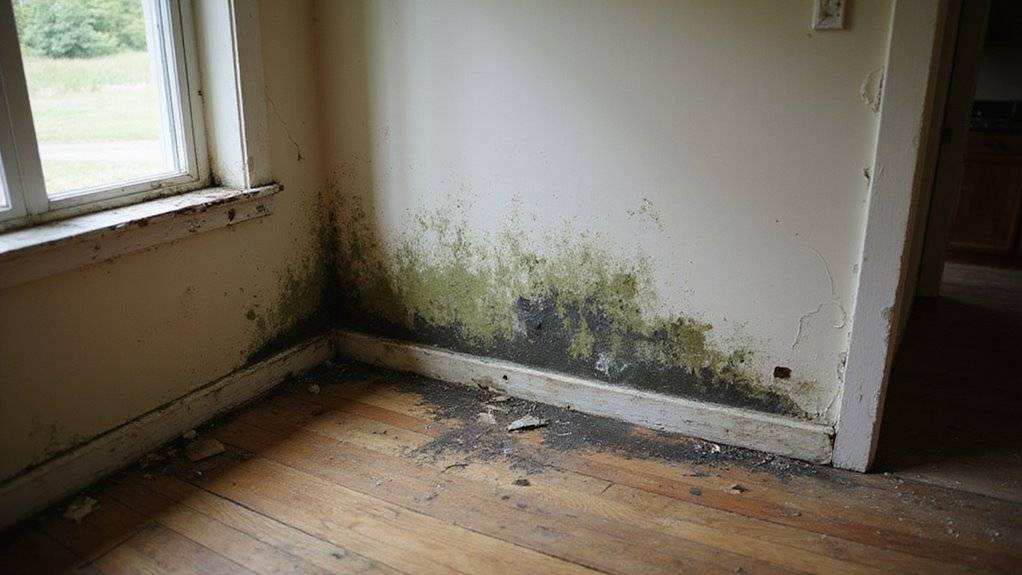Selling a house with mold issues in Missouri can feel overwhelming. Mold is a serious concern for buyers and sellers alike. It can impact health, property value, and your ability to sell quickly.
Buyers may walk away or demand steep discounts. Legal risks rise if you fail to disclose the problem. The process can leave you feeling stuck and frustrated. You can sell a house with mold in Missouri by disclosing the problem, following the law, and preparing for negotiations.
This guide will show you clear steps to handle mold issues and move forward with your sale. You will find practical solutions in this blog to help you succeed.
Key Takeaways
- Disclose all known mold problems and remediation efforts to buyers using Missouri’s required seller disclosure forms before contract signing.
- Obtain a professional mold inspection from a certified local expert to identify the extent and source of mold issues.
- Organize and provide documentation, including inspection reports, remediation invoices, and maintenance records, to buyers during negotiations.
- Decide whether to remediate the mold before selling or sell the house as-is, considering costs, market conditions, and buyer expectations.
- Work with experienced real estate agents or cash buyers familiar with Missouri’s legal requirements for a compliant and efficient sale.
Understanding Mold Problems in Missouri Homes

Missouri homes often have mold problems because of the state’s humid and rainy weather. Mold can appear as spots or cause a musty smell. If you see or smell mold, it could affect your home’s value. Disclosing mold issues is required by law, so homeowners must inform potential buyers about any mold problems they are aware of.
Health Risks Associated With Mold
When you’re selling a house with mold, you need to recognize the health risks it poses—including respiratory illnesses, allergies, and more severe reactions. Children, seniors, and those with weakened immune systems face greater dangers from exposure. Ignoring these risks can lead to long-term health problems and potential legal liabilities during your sale.
Common Mold-Related Illnesses
Mold can cause several common health problems. It often leads to coughing, sneezing, and throat irritation. People with allergies or asthma may notice their symptoms getting worse.
Prolonged exposure may also cause skin rashes or eye irritation. If you have young children or elderly family members, they may be more at risk. Prospective buyers may avoid homes with known mold issues.
If you plan to sell your home, you must disclose any mold problems in Missouri. Addressing mold early helps keep your home safe and marketable. Ignoring mold can lead to legal and financial trouble later.
Vulnerable Groups at Risk
Some people have a higher risk of health problems from mold. These include young children, older adults, and people with weak immune systems. If your home has mold, extra care is needed for these groups.
Children can get sick more easily because their bodies are still growing. Older adults may have weaker immune systems or other health issues. People with immune problems face greater risks from mold exposure.
Missouri law does not protect you from responsibility if a buyer is vulnerable. You must tell buyers about any mold you know about. Good insulation, fixing leaks, and keeping humidity low can help stop mold growth.
If you want to protect at-risk people, consider removing mold before selling. It is both the right thing to do and legally smart. Always disclose known mold problems to buyers.
Long-Term Exposure Effects
Long-term exposure to mold can cause serious health problems. These issues are especially risky for children, seniors, or people with weak immune systems. Missouri homeowners should know that mold can also affect the value and sale of their house.
If you do not fix mold problems, you could face legal trouble when selling your home. Buyers may be less likely to purchase a house with a history of mold. You should always disclose any known mold issues to avoid future problems.
Some long-term effects of mold include breathing problems like asthma or a constant cough. Mold can also cause headaches, memory problems, or changes in mood. Over time, it might weaken your immune system, making you get sick more often.
Missouri’s Mold Disclosure Requirements
When selling a house in Missouri, you must complete mandatory seller disclosure forms that address the presence of mold. If you fail to disclose known mold issues, you risk serious legal penalties and possible lawsuits. Make sure you follow proper buyer notification procedures to protect yourself and comply with state law.
Additionally, being aware of state-specific disclosure laws can help ensure you meet all legal requirements when selling a property with mold concerns. Understanding sale-leaseback arrangements can also be beneficial if you are considering options to manage your property’s financial aspects while handling mold remediation.
Mandatory Seller Disclosure Forms
Missouri law requires sellers to use mandatory disclosure forms. These forms ensure buyers know about important issues like mold. You must provide full and accurate details about your home’s condition.
Sellers must reveal any known mold problems. This includes past issues, repairs, and the current situation. If you hide information, you could face legal trouble.
The Missouri Seller’s Disclosure Statement is the main form to use. Sellers should fill out every section honestly, not just the mold questions. If you skip details, buyers may lose trust.
Completed forms should be given to buyers before signing a contract. Prompt disclosure helps protect you and the buyer. Proper forms keep the sale process smooth and legal.
Penalties for Non-Disclosure
If you do not tell buyers about mold in your Missouri home, you could face legal and financial trouble. The law in Missouri requires sellers to disclose known mold problems on official forms. Buyers can take legal action if you hide these issues.
Buyers may sue you for damages, cancel the sale, or ask for money to fix the mold. Courts could order you to pay for health costs if mold causes harm. You might also have to pay attorney fees if you lose.
If you break environmental rules or ignore prevention, the court may side with the buyer. Civil penalties are possible in severe cases. Honest disclosure protects both you and the buyer, and helps you follow Missouri law.
Buyer Notification Procedures
Missouri law requires you to tell buyers about any known mold issues. You must give honest information to avoid legal problems. If you hide facts, you may face liability.
You do not need a special mold disclosure form in Missouri. Sellers must still share all important facts about mold. This includes details about any past mold removal or prevention steps.
Always list any known mold, past or present, on the Seller’s Disclosure Statement. Provide buyers with documents about previous mold work. If buyers ask, let them inspect the home for mold.
These steps protect you from legal issues and help buyers trust you. If you follow these rules, you make the sale process safer for everyone.
Identifying the Source and Extent of Mold
To find mold in your home, you must check where it may be growing and how much is present. Mold often grows in Missouri because of the humid weather. Identifying all mold areas is necessary before selling your house.
Basements, bathrooms, attics, and places with leaks are common spots for mold. Look for musty smells, water stains, or dark patches. If you see these signs, mold could be hiding in walls, under floors, or inside vents. Being aware of local climate conditions can help you anticipate potential mold growth areas. Additionally, understanding area-specific moisture issues can aid in thorough inspections.
Missouri law says you must tell buyers if you know about mold issues. Keep notes and pictures of what you find during your inspection. If you fix mold problems early, buyers will trust your property more.
Getting a Professional Mold Inspection

You’ll need to hire a certified mold inspector to ensure your assessment meets Missouri’s legal standards and protects your interests. Understand what’s included in the inspection report, as buyers and their agents will scrutinize these findings. Be prepared for inspection costs and timelines, as both can impact your selling process and disclosure obligations.
Additionally, working with a local, family-owned business can provide you with trustworthy guidance and support throughout the inspection and selling process. Proper documentation of the inspection results can help you navigate potential capital gains tax implications if your home sale results in a profit and you meet the residency requirements.
Choosing Certified Mold Inspectors
Certified mold inspectors are important when selling your Missouri home. These experts help protect your property’s value and keep you legally safe. If you want accurate results, you must choose your inspector carefully.
Missouri does not require mold inspectors to have state licenses. You should check for certifications from groups like ACAC or NAMRI. If an inspector has these, it shows they meet good standards.
Experience matters in mold inspection. Select someone who has handled many Missouri homes. This helps ensure they know what to look for.
Proper tools are important for a thorough inspection. Inspectors should use moisture meters and air sampling for best results. If they cannot explain their methods, consider another choice.
Choosing a qualified inspector can make your home sale smoother. It also helps you avoid legal trouble. If you take time to choose wisely, you protect your interests.
Understanding Inspection Reports
A mold inspection report in Missouri helps you understand mold problems in a home. The summary section lists the main findings. If you need to make decisions, start by reading this summary.
The report shows where mold is found, what type it is, and how much there is. Mold types can affect health, so check this section. The location details help plan how to fix the problem.
If the report explains causes, it often points to moisture sources. You should address these to prevent mold from coming back. Recommendations usually include steps for cleaning and regular maintenance.
Missouri law says sellers must tell buyers about known mold issues. If you do not understand the report, you may risk legal trouble. Use the information to guide repairs and protect everyone’s health.
Inspection Costs and Timeline
Inspection costs in Missouri usually range from $300 to $700. Prices depend on your home’s size and how much mold is suspected. Scheduling often takes a few days, and results come within a week.
Homeowners should plan for these costs early. Early scheduling helps keep your selling process on track. If you wait too long, you may delay your sale.
The inspection report usually arrives within a week after the visit. Sellers should review this report before sharing findings with buyers. Prompt action ensures legal compliance and keeps buyers informed.
Estimating the Cost of Mold Remediation

Mold remediation costs depend on several factors. These include the size of the area, how much mold is present, and the type of treatment needed. If you are selling property in Missouri, you need to know these costs. Proper mold removal is essential to ensure the health and safety of future occupants and to comply with state disclosure laws.
The price for professional mold removal usually ranges from $500 to $6,000. Large or hidden mold problems can make the cost higher. Missouri law requires you to tell buyers about known mold issues.
If the affected area is small, costs will be lower. Surface mold can often be cleaned easily and for less money. Severe mold growth or damage to structures will need full removal, which costs more.
Investing in mold prevention can save you money in the future. You can use the table below to see how different factors affect your costs. Accurate estimates help you follow the law and stay honest with buyers. Understanding mold inspection procedures can help identify hidden issues early, potentially reducing remediation costs.
Deciding Whether to Fix or Sell As-Is
You’ll need to weigh the cost of mold remediation against the potential impact on your home’s market value before making a decision. Missouri law requires you to disclose known mold issues, so factor legal obligations into your strategy. Carefully assess whether fixing the problem or selling as-is best aligns with your financial goals and risk tolerance.
Considering the presence of mold, it’s also wise to evaluate home inspection requirements and how they might influence the sale process. Additionally, understanding the real estate market conditions can help determine whether investing in repairs will provide a better return or if selling quickly as-is is more advantageous.
Assessing Mold Remediation Costs
Assessing mold remediation costs means understanding what it will take to fix mold problems in your Missouri home. You need to know these costs before deciding to repair or sell as-is.
A licensed professional should inspect your home to find out how much mold is present. The type of mold, size of the area, and needed repairs will affect the final cost. If you get several quotes, you will better understand what you might pay.
Written estimates from certified companies are important for your records. Missouri law requires you to share this information with buyers. If you follow these steps, you show buyers you have handled the problem responsibly.
If costs are too high, you might choose to sell the home as-is. If repairs are affordable, fixing the mold could make your home easier to sell. Comparing both options helps you make the best choice.
Weighing Market Value Impact
Mold in your Missouri home can lower its market value. Buyers may offer less or skip your home completely. If you repair the mold, you might get a higher price, but it costs more upfront.
Selling as-is usually means a lower price but a quicker sale. Investors often look for homes with issues like mold. Neighborhood appraisals set value limits, and mold disclosure can lower these numbers.
Cosmetic fixes alone rarely solve the problem. Buyers may still ask for a full mold removal. Always look at recent sales of similar homes before making a decision.
Understanding Disclosure Requirements
Missouri law says you must tell buyers about any known defects, including mold. If you do not, you could face legal trouble. Mold problems must always be shared with buyers.
You should fill out the Seller’s Disclosure Statement. This form asks about any mold, repairs, or water damage you know about. Giving full details helps avoid issues later.
Rules in Missouri can change over time. If you are unsure, check for any updates about mold and disclosure rules. Following the latest guidelines keeps you safe.
If you want extra protection, talk to a real estate attorney. A lawyer can help you understand your responsibilities. Legal advice also lowers your risk of future problems.
Marketing Strategies for Mold-Affected Properties
Mold-affected properties need a special marketing plan. Buyers must know about mold problems and Missouri’s disclosure laws. If you follow these rules, you can attract the right buyers.
Professional home staging can show off the best rooms and hide less appealing spots. Virtual tours help buyers see the property before visiting. If you use these tools, you can reach more interested people.
Always give clear details about any mold and what you have done to fix it. All marketing materials must follow state laws to avoid legal issues. If you stay honest and clear, you can build trust with buyers. Understanding Sell Your House Without an Agent options can also help you sell quickly and conveniently.
Additionally, partnering with local experts who understand the St. Charles County real estate market and its unique challenges can enhance your marketing efforts and ensure compliance with all legal requirements.
Selling to Cash Buyers or Investors
Cash buyers or investors can help you sell a house with mold quickly. They often buy properties “as-is,” so you do not need to fix the mold. This saves you time and money. Additionally, being transparent about co-ownershiprequirements ensures all parties are aware of legal obligations, which can streamline the sale process.
Missouri law requires you to disclose all mold issues in writing. You should give buyers any inspection reports or records about mold prevention. Doing this protects you from future legal problems. Cash buyers expect some repairs and know how to handle them. Negotiation is simpler because they understand the risks. If you prepare your documents, you can close the sale smoothly and fast.
Working With Real Estate Agents Experienced With Mold
Working with a real estate agent who has experience with mold is important. Such an agent understands how to handle mold issues in home sales. This makes the process safer and easier for you.
An experienced agent knows Missouri’s rules about telling buyers if there is mold. They also understand how to fix and prevent mold problems. If you want to avoid legal trouble, you should choose someone who knows these rules.
Agents with mold experience can help you set the right price for your home. They know how to show buyers what steps you took to deal with mold. If your agent is honest and clear, buyers will feel more confident.
Negotiating With Buyers Over Mold Issues
Mold issues can make selling a home more difficult. You should be honest and well-prepared when negotiating with buyers. Buyers in Missouri expect full disclosure about any mold problems.
You can build trust by sharing all inspection and testing reports as soon as possible. Any steps taken for mold prevention, like repairs or professional cleaning, should be explained clearly. If buyers ask for repairs or price reductions, use your records to support your response.
Buyers may ask for credits or fixes if mold is found. Providing proof of past remediation helps your case. A fair and open approach can lead to a smoother sale.
Legal Considerations and Potential Liabilities
Missouri law says sellers must tell buyers about known material defects. Mold is a material defect and an environmental hazard. If you know about mold, you must disclose it to buyers.
If you hide mold problems, you could face legal problems. Buyers may sue for fraud or misrepresentation if they find hidden mold after closing. Courts in Missouri often support buyers in these cases.
If a court rules against you, you might have to pay for repairs or settlements. Honest disclosure protects you from these risks. If you are unsure, ask a real estate lawyer for advice.
Always tell buyers about all known mold issues, even if you fixed them. Clear disclosure helps avoid legal trouble and keeps the sale process smooth.
Preparing Mold Documentation and Reports
Missouri law requires you to disclose known mold issues. You must collect clear records to protect yourself from legal problems. Proper documentation also helps buyers trust you.
You should save all inspection reports describing mold and its location. These reports show what was found in your home. They are important for both you and the buyer.
If you hired professionals, keep their invoices and remediation reports. These documents show what work was done and when. Buyers will want to see proof that mold was removed by experts.
Maintenance logs are useful if you took steps after remediation. Include dates and contractor names in your records. This helps buyers see you maintained the property after fixing the mold.
If you organize these documents, you meet Missouri’s rules and protect yourself. Buyers are more likely to feel confident in your home. Proper paperwork can prevent future disputes.
Tips for a Smooth Closing Process
To have a smooth closing, follow some key steps. Always share complete and correct mold information with buyers and their agents. Missouri law requires you to be honest about any mold problems. Disclose all mold details to buyers and agents—Missouri law requires complete honesty for a smooth, trouble-free closing.
If buyers have questions, answer them quickly. Updated mold reports should be provided as soon as you get them. Legal disclosures must be thorough and accurate to avoid issues later.
Professional home staging can help your house look its best. Highlight the good features of your property without hiding any problems. If possible, mention nearby parks, schools, or shops to increase buyer interest.
Work with your real estate agent and attorney to handle all paperwork. Check that all repairs and conditions are finished before the final walkthrough. Careful preparation can help prevent last-minute problems and keep you in compliance with the law.
Conclusion
If you need to sell a house with mold issues in Missouri, it is important to follow the correct steps. Sellers should always disclose any mold problems and provide proper documentation. If you work with professionals, you can avoid legal trouble and protect your reputation.
If you want a faster solution, we buy houses with mold for cash in Missouri. Freedom Path Investors makes the process simple and stress-free. You do not need to spend money on repairs or cleaning.
If you are ready to sell your house with mold, contact us today. We can give you a fair cash offer quickly. Let Freedom Path Investors help you move forward with confidence.







